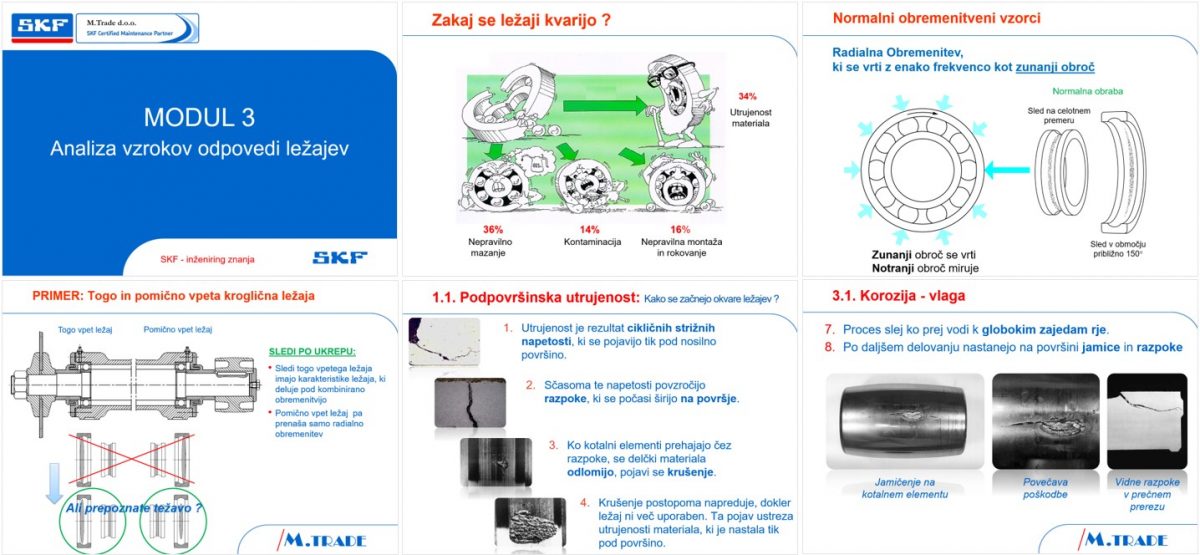Introduction
Modul 3: Analiza vzrokov odpovedi ležajevModule 3: Analysis of causes of bearing failure
Training participants to analyses bearing failure and identify the true causes of bearing failure.
Target group:
All maintenance engineers and their managers. People working in service, maintenance, repair, industrial drives engineering teams. Managers and technicians of industrial plant and production responsible for the maintenance and life of rolling bearings. Persons supervising rotating machinery, engineers in charge of maintenance of plant, mechanics and supervising maintenance technicians.
Module objectives:
The objectives of the module are to train technicians and specialists to optimally analyses bearing failure and to solve problems related to bearing failure. They will understand:
– All the activities required for bearing failure analysis and lubrication
– How to combine and apply knowledge of bearings, lubrication and sealing to find answers to bearing problems
– How to find the answer to eliminate and reduce bearing failure problems
– How to apply new skills to implement proactive maintenance and reduce problems
Module Description:
In this module, students learn about the important aspects of bearing failure. The development of the corresponding skills is focused through a practical understanding of bearing damage phenomena in terms of identifying the most common cases of bearing damage and suggesting corrective actions. Students learn about damage caused by material fatigue, wear, corrosion, improper lubrication.
Guidance:
The training programme is led by Dr. Boštjan Vaupotič, SKF certified CMP inspector. He is one of the experts in the SKF distributor network in Europe who has completed all SKF Distributor College courses. He is certified in SKF reliability systems for bearing lubrication, bearing maintenance and condition monitoring of industrial drives. He is involved in bearing failure root cause analysis, in-service condition measurement of bearings and gears, machine vibration measurement and analysis, lubricant wear measurement, maintenance process optimization, design and installation of lubrication systems, etc.
Certificate:
At the end of the course, participants take a test and receive a certificate of successful completion.
Prerequisites:
Participants must be familiar with the basic concepts of occupational safety, and have basic knowledge and skills in the use of basic hand tools.
Training venue:
Theoretical and practical lessons are held at the premises of M.Trade d.o.o. or at your premises or by arrangement.
Duration:
The module can be fully tailored to your requirements in terms of content and time. The entire module lasts 14 school hours – 1.5 days.
Details
Content:
1. The module has the following main features:
- Classification of damage, causes, and correction by action
- Damage analysis – knowing how and knowing why?
- Knowing the instruments for bearing damage analysis
- Quality literature with theoretical explanations and many photographs of bearing damage
2. After the final package the students will:
- Know the different forms of bearing damage and their phenomena
- Be able to analyze and determine the cause of bearing failure
- Understand and be able to explain the signs of bearing failure
- Be competent to propose corrective measures to reduce and prevent bearing failure
- Be able to use the planned ISO damage classification system

